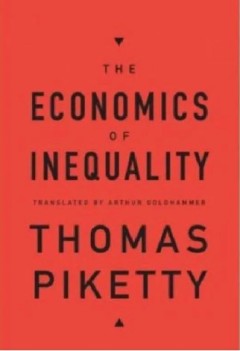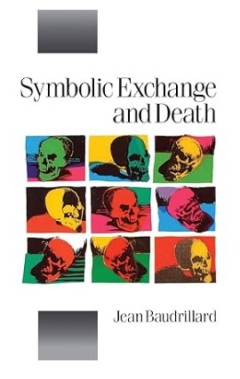Ditapis dengan

The Economics of Inequality
- Edisi
- First Published
- ISBN/ISSN
- 978-0-674-50480-6
- Deskripsi Fisik
- vii + 142 pgs.; 21,5 cm.
- Judul Seri
- -
- No. Panggil
- 339.22 PIK e
- Edisi
- First Published
- ISBN/ISSN
- 978-0-674-50480-6
- Deskripsi Fisik
- vii + 142 pgs.; 21,5 cm.
- Judul Seri
- -
- No. Panggil
- 339.22 PIK e

Perempuan, Konflik dan Perdamaina : Tuturan Perempuan Korban dan penyintas Ko…
- Edisi
- Cetakan ke-1
- ISBN/ISSN
- 978-602-6260-63-5
- Deskripsi Fisik
- 506 hlm.; 28,5 cm.
- Judul Seri
- -
- No. Panggil
- 305.4209598 PER p
- Edisi
- Cetakan ke-1
- ISBN/ISSN
- 978-602-6260-63-5
- Deskripsi Fisik
- 506 hlm.; 28,5 cm.
- Judul Seri
- -
- No. Panggil
- 305.4209598 PER p

Symbolic Exchange and Death
Jean Baudrillard is one of the most celebrated and most controversial of contemporary social theorists. This major work, appearing in English for the first time, occupies a central place in the rethinking of the humanities and social sciences around the idea of postmodernism. It leads the reader on an exhilarating tour encompassing the end of Marxism, the enchantment of fashion, symbolism abou…
- Edisi
- First Published
- ISBN/ISSN
- 0-8039-8398-0
- Deskripsi Fisik
- xiv + 254 pgs.; 23,5 cm.
- Judul Seri
- -
- No. Panggil
- 301.01 BAU s

Islam, Pancasila dan Asas Tunggal
- Edisi
- Cetakan ke-1
- ISBN/ISSN
- -
- Deskripsi Fisik
- 149 hlm.; 18,5 cm.
- Judul Seri
- -
- No. Panggil
- 344.18 NOE i
- Edisi
- Cetakan ke-1
- ISBN/ISSN
- -
- Deskripsi Fisik
- 149 hlm.; 18,5 cm.
- Judul Seri
- -
- No. Panggil
- 344.18 NOE i

Power and Terror : Perbincangan Pasca Tragedi WTC 11 September 2001 : Menguak…
Power and Terror menyajikan pemikiran Noam Chomsky paling mutakhir, melalui interview panjang dan serangkaian ceramah yang dia berikan di New York dan California selama musim semi 2002. Sebagaimana telah dilakukannya berulang kali sejak peristiwa tanggal 11 September 2001, dia menempatkan serangan teroris dalam konteks intervensi kebijakan politik luar negeri Amerika setelah beberapa dekade pas…
- Edisi
- Cetakan ke-1
- ISBN/ISSN
- 978-3016-30-2
- Deskripsi Fisik
- ix + 146 hlm.; 21 cm.
- Judul Seri
- -
- No. Panggil
- 327.1 CHO p

Kuliah Sambil Kerja di Negeri Kanguru
- Edisi
- Edisi ke-1
- ISBN/ISSN
- 978-763-029-3
- Deskripsi Fisik
- viii + 88 hlm.; 21 cm.
- Judul Seri
- -
- No. Panggil
- 378.52 GUN k
- Edisi
- Edisi ke-1
- ISBN/ISSN
- 978-763-029-3
- Deskripsi Fisik
- viii + 88 hlm.; 21 cm.
- Judul Seri
- -
- No. Panggil
- 378.52 GUN k

The Defense Counsel
- Edisi
- First Published
- ISBN/ISSN
- 0-8039-2024-5
- Deskripsi Fisik
- 312 pgs.; 22,5 cm.
- Judul Seri
- -
- No. Panggil
- 347.7316 DEF d
- Edisi
- First Published
- ISBN/ISSN
- 0-8039-2024-5
- Deskripsi Fisik
- 312 pgs.; 22,5 cm.
- Judul Seri
- -
- No. Panggil
- 347.7316 DEF d

Drugs, Society and Behavior 89/90
- Edisi
- Fourth Edition
- ISBN/ISSN
- 0-87967-784-8
- Deskripsi Fisik
- xiii + 241 pgs.; 27,5 cm.
- Judul Seri
- -
- No. Panggil
- 362.292097305 DRU d
- Edisi
- Fourth Edition
- ISBN/ISSN
- 0-87967-784-8
- Deskripsi Fisik
- xiii + 241 pgs.; 27,5 cm.
- Judul Seri
- -
- No. Panggil
- 362.292097305 DRU d

Delinquency and Community : Creating Opportunities and Controls
- Edisi
- First Published
- ISBN/ISSN
- 0-8039-2514-X
- Deskripsi Fisik
- 208 pgs.; 22,5 cm.
- Judul Seri
- -
- No. Panggil
- 364.6088055 MIL d
- Edisi
- First Published
- ISBN/ISSN
- 0-8039-2514-X
- Deskripsi Fisik
- 208 pgs.; 22,5 cm.
- Judul Seri
- -
- No. Panggil
- 364.6088055 MIL d

The Rehabilitation Detectives : Doing Human Service Work
- Edisi
- First Published
- ISBN/ISSN
- 0-8039-2450-X
- Deskripsi Fisik
- 240 pgs.; 21,5 cm.
- Judul Seri
- -
- No. Panggil
- 362.0425 HIG r
- Edisi
- First Published
- ISBN/ISSN
- 0-8039-2450-X
- Deskripsi Fisik
- 240 pgs.; 21,5 cm.
- Judul Seri
- -
- No. Panggil
- 362.0425 HIG r
 Karya Umum
Karya Umum  Filsafat
Filsafat  Agama
Agama  Ilmu-ilmu Sosial
Ilmu-ilmu Sosial  Bahasa
Bahasa  Ilmu-ilmu Murni
Ilmu-ilmu Murni  Ilmu-ilmu Terapan
Ilmu-ilmu Terapan  Kesenian, Hiburan, dan Olahraga
Kesenian, Hiburan, dan Olahraga  Kesusastraan
Kesusastraan  Geografi dan Sejarah
Geografi dan Sejarah